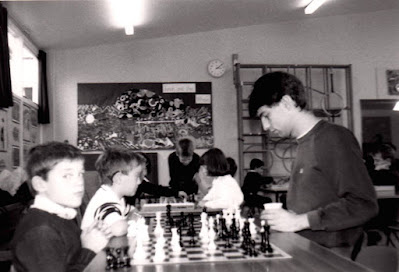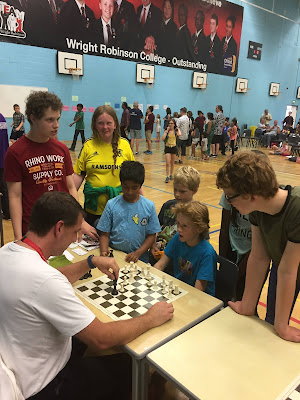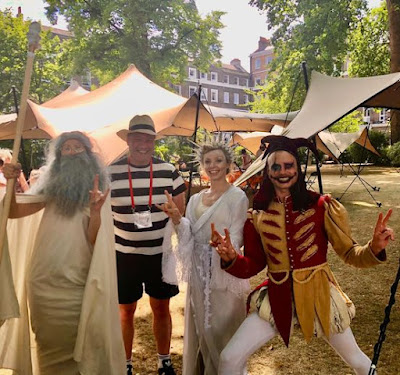Wednesday, 31 August 2022
Testing, Testing...
Our CSC Teesside tutors are testing their equipment this week, ahead of the big return to classroom action next week.
English Chess Federation BOOK of the YEAR 2022 Short List
English Chess Federation
BOOK of the YEAR 2022
Short List
Many of the high quality books received this year concentrated on chess training. Perhaps reflecting current anxieties the emphasis was not only on chess positions, but also on how the chess mind
works in actual play. Three have been selected. The exception was the final volume in a trilogy on one of the greatest players who ever lived.
Analyzing the Chess Mind Gulko and Sneed Quality Chess pp 224 £26.99
Gulko is an extremely strong grandmaster who uniquely has won both the Soviet and US championships, while Sneed is a Professor of Psychology. Together they are very well placed to consider chess mind issues in a well – chosen selection of games and positions. Two sample subjects: Losing winning positions and Problems in self- confidence. This book is both instructive and very readable.
Emanuel Lasker Volume Three
Forster, Negele, Tischbierek editors Exzelsior Verlag pp 468 £54.95
Subtitled, Labours and Legacy Chess, Philosophy and Psychology this third volume which covers Lasker’s life from 1914 to his death in New York in 1942. Lasker was a complex man with a myriad of interests and occupations outside chess. It has needed three large volumes to adequately cover all aspects of Lasker’s life. This volume, with the two previous volumes, (both of which featured in earlier Short Lists), are the work of many experts over more than a decade. They and the books do full justice to a world champion of 27 years. An outstanding trilogy in every way.
Improve Your Chess Calculation
Ramesh New in Chess pp332 £26.95
This is the book for anyone who wishes to improve their calculation abilities and work their way through this substantial volume. But it is much more than that as many other aspects of chess improvement are touched upon throughout the text. Ramesh is a very gifted coach and writer. He was coach to the Indian “B” team consisting of young players, most of whom are his pupils, to a bronze medal at the recent Olympiad, ahead of the Indian “A” team. No wonder that this book is already a best seller.
Think Like a Super-GM
Adams and Hurtado Quality Chess pp464 £29.50
Adams, a super-GM himself, and Hurtado who has an engineering scientific, statistical background, have teamed up to produce a most interesting book which works on several levels. Players of varying abilities from amateur to GM were asked to examine 40 selected positions, find the best and follow up moves, whilst their time taken and thoughts were recorded, which were then analysed and compared. Readers can test themselves and calculate their performance. Adams provides analysis and after each puzzle “Adams Insight”. Both authors provide interesting essays on aspects of what makes (or does not) a super-GM. Quality Chess deserve credit for investing in the work behind the book and it is produced to their usual high standards.
Ray Edwards Jovanka Houska Sean Marsh 31 August 2022
BOOK of the YEAR 2022
Short List
Many of the high quality books received this year concentrated on chess training. Perhaps reflecting current anxieties the emphasis was not only on chess positions, but also on how the chess mind
works in actual play. Three have been selected. The exception was the final volume in a trilogy on one of the greatest players who ever lived.
Analyzing the Chess Mind Gulko and Sneed Quality Chess pp 224 £26.99
Gulko is an extremely strong grandmaster who uniquely has won both the Soviet and US championships, while Sneed is a Professor of Psychology. Together they are very well placed to consider chess mind issues in a well – chosen selection of games and positions. Two sample subjects: Losing winning positions and Problems in self- confidence. This book is both instructive and very readable.
Emanuel Lasker Volume Three
Forster, Negele, Tischbierek editors Exzelsior Verlag pp 468 £54.95
Subtitled, Labours and Legacy Chess, Philosophy and Psychology this third volume which covers Lasker’s life from 1914 to his death in New York in 1942. Lasker was a complex man with a myriad of interests and occupations outside chess. It has needed three large volumes to adequately cover all aspects of Lasker’s life. This volume, with the two previous volumes, (both of which featured in earlier Short Lists), are the work of many experts over more than a decade. They and the books do full justice to a world champion of 27 years. An outstanding trilogy in every way.
Improve Your Chess Calculation
Ramesh New in Chess pp332 £26.95
This is the book for anyone who wishes to improve their calculation abilities and work their way through this substantial volume. But it is much more than that as many other aspects of chess improvement are touched upon throughout the text. Ramesh is a very gifted coach and writer. He was coach to the Indian “B” team consisting of young players, most of whom are his pupils, to a bronze medal at the recent Olympiad, ahead of the Indian “A” team. No wonder that this book is already a best seller.
Think Like a Super-GM
Adams and Hurtado Quality Chess pp464 £29.50
Adams, a super-GM himself, and Hurtado who has an engineering scientific, statistical background, have teamed up to produce a most interesting book which works on several levels. Players of varying abilities from amateur to GM were asked to examine 40 selected positions, find the best and follow up moves, whilst their time taken and thoughts were recorded, which were then analysed and compared. Readers can test themselves and calculate their performance. Adams provides analysis and after each puzzle “Adams Insight”. Both authors provide interesting essays on aspects of what makes (or does not) a super-GM. Quality Chess deserve credit for investing in the work behind the book and it is produced to their usual high standards.
Ray Edwards Jovanka Houska Sean Marsh 31 August 2022
Monday, 29 August 2022
On the Brink of Year 35
I am ready to start my 35th consecutive year of teaching chess in schools.
Every year, I have the same thoughts and questions, including:
'Can I still teach as well as I did last year?'
'What new obstacles will I find in my way this time?'
'How much can I achieve with all of my schools and pupils?'
'Will this year be the last?'
Over the course of the first 34 years, there has been much I have enjoyed. Many people have done their best to help me and some have remained extraordinarily loyal for a very long time. One day, I will write all about my favourite people.
There has also been much I have had to endure, with some people trying their hardest to stand in the way of progress. I try not to suffer fools at all, let alone gladly; something I have been working on in recent times - and very successfully, too.Also, what passes for normal behaviour in the classroom has changed dramatically and alarmingly for the worse. One day, I will reveal all of the extremes, but most of it will be unbelievable to anyone who does not work in schools.
I don't need to prove anything about the benefits of chess. They should be too obvious. The important detail is that the skills we encourage to develop are definitely transferable.Strong chess players can make very poor tutors. Great teachers can be novice chess players. Which is the better combination of the two? The one with the great teacher - every time. Great teachers can teach virtually anything. Strong chess players can really struggle to find the most suitable level to be able teach chess successfully.
What does teaching chess in schools entail? A plethora of skills one wouldn't normally suspect were required. Lifting and rearranging furniture - and making sure it is all back in the correct place afterwards. Making sure children are collected by their parents at the end of an after-school session. Not really the chess tutor's job, but who else is going to do it?
Taking the register if the teacher is late into class. Maintaining classroom discipline. Not upsetting teachers from neighbouring classrooms with the unmistakable sounds of children having fun. Finding another room to make way for someone else. In the distant past I fell for the 'one where we use the school hall and get booted out shortly after starting because it's nearly lunchtime.'
One learns to avoid the more obvious traps, over time.
One learns to avoid the more obvious traps, over time.
Working in schools is a proven way to build up resilience and moral fibre.
The largest class I've ever had? Over 65 - in a Secondary School. They had messed up the internal timings and sent three groups at once (send three groups at once in 2022 and the number of children could well exceed 100).
The largest class I've ever had? Over 65 - in a Secondary School. They had messed up the internal timings and sent three groups at once (send three groups at once in 2022 and the number of children could well exceed 100).
The smallest room I've ever been expected to use? A broom cupboard - and I still had to share with the brooms and buckets.
The journey continues. The remarkably good people still outnumber the remarkably bad ones; an important yardstick. Although the winds of change continue to blow. David Hardy and Richard Harding, two of my closest friends, retired from frontline chess teaching this year and my own world will be a poorer place now that I will no longer be able to work alongside them.
Will this year be the last? All manner of futures are possible, from this moment on.
In recent times, there has been an unexpected pandemic through which to navigate. It could have destroyed most of what it took so many years to build up and maintain, yet by retraining to accommodate the option of online delivery enough continuity was retained to keep on going and to pick up the fragments afterwards.
We continue to lurch from crisis to crisis. Will schools still be able to fund 'luxury items' now that their power bills are quadrupling? Indeed - will any of us manage to keep on going and still be able to pay the bills? Serious consequences will have to be endured as we are forced to pick up the tab for the extreme profiteering of others.
Yes; let's keep the journey going for a while longer. I still have new plans and projects in mind and it will be interesting to see how much more can be achieved.
Two New Tournaments
The 27th Yarm Team Chess Championship will be held on Saturday 8 October 2022.
This event, which is one of the longest-running series of chess tournaments in the world, will be held at Yarm Preparatory School and is for Primary School teams of four players.
Full details will be distributed to our active schools for the start of the new school year and updates will follow here, on my blog and on the CSC Teesside Twitter account.
Meanwhile, older children who would like to take part in a chess competition on the same day will be very pleased to see that Kevin Wilson, of Darlington Chess Club, has created a brand new one and here are the details:
'Darlington Junior Chess competion is open to all chess playing school children up to year 11. There will be 4 age graded sections with a trophy for first, second and third in each section.
All participants will play 5 games, this is not a knockout tournament.
There will be a tuck shop available on-site, but recommend to bring a packed lunch.
Parking is available at the venue free of charge for 50 cars.
Entry fee is £7 in all sections.
To enter contact darlingtonchessclub[at]gmail.com stating
- Name
- Age
- Parent / Carer contact details
Payment may be made on the day, or via bank transfer (Details made available on email reply).'
This event, which is one of the longest-running series of chess tournaments in the world, will be held at Yarm Preparatory School and is for Primary School teams of four players.
Full details will be distributed to our active schools for the start of the new school year and updates will follow here, on my blog and on the CSC Teesside Twitter account.
Meanwhile, older children who would like to take part in a chess competition on the same day will be very pleased to see that Kevin Wilson, of Darlington Chess Club, has created a brand new one and here are the details:
'Darlington Junior Chess competion is open to all chess playing school children up to year 11. There will be 4 age graded sections with a trophy for first, second and third in each section.
All participants will play 5 games, this is not a knockout tournament.
There will be a tuck shop available on-site, but recommend to bring a packed lunch.
Parking is available at the venue free of charge for 50 cars.
Entry fee is £7 in all sections.
To enter contact darlingtonchessclub[at]gmail.com stating
- Name
- Age
- Parent / Carer contact details
Payment may be made on the day, or via bank transfer (Details made available on email reply).'
Preparing for the New School Year
Our team of CSC Teesside chess tutors is currently preparing for the big return to the classroom for the new school year.
We have 15 schools for our weekly curriculum sessions and they are:
Abingdon
The Avenue
Billingham South
Errington
Fairfield
Hemlington Hall
Holy Trinity
Ings Farm
Mill Lane
Park End
Preston
Throston
Wheatlands
Westgarth
Whale Hill
If your school is not one of the 15, but you would like to investigate the possibility of having our tutors deliver weekly sessions to your children, then please let me know.
We have 15 schools for our weekly curriculum sessions and they are:
Abingdon
The Avenue
Billingham South
Errington
Fairfield
Hemlington Hall
Holy Trinity
Ings Farm
Mill Lane
Park End
Preston
Throston
Wheatlands
Westgarth
Whale Hill
If your school is not one of the 15, but you would like to investigate the possibility of having our tutors deliver weekly sessions to your children, then please let me know.














